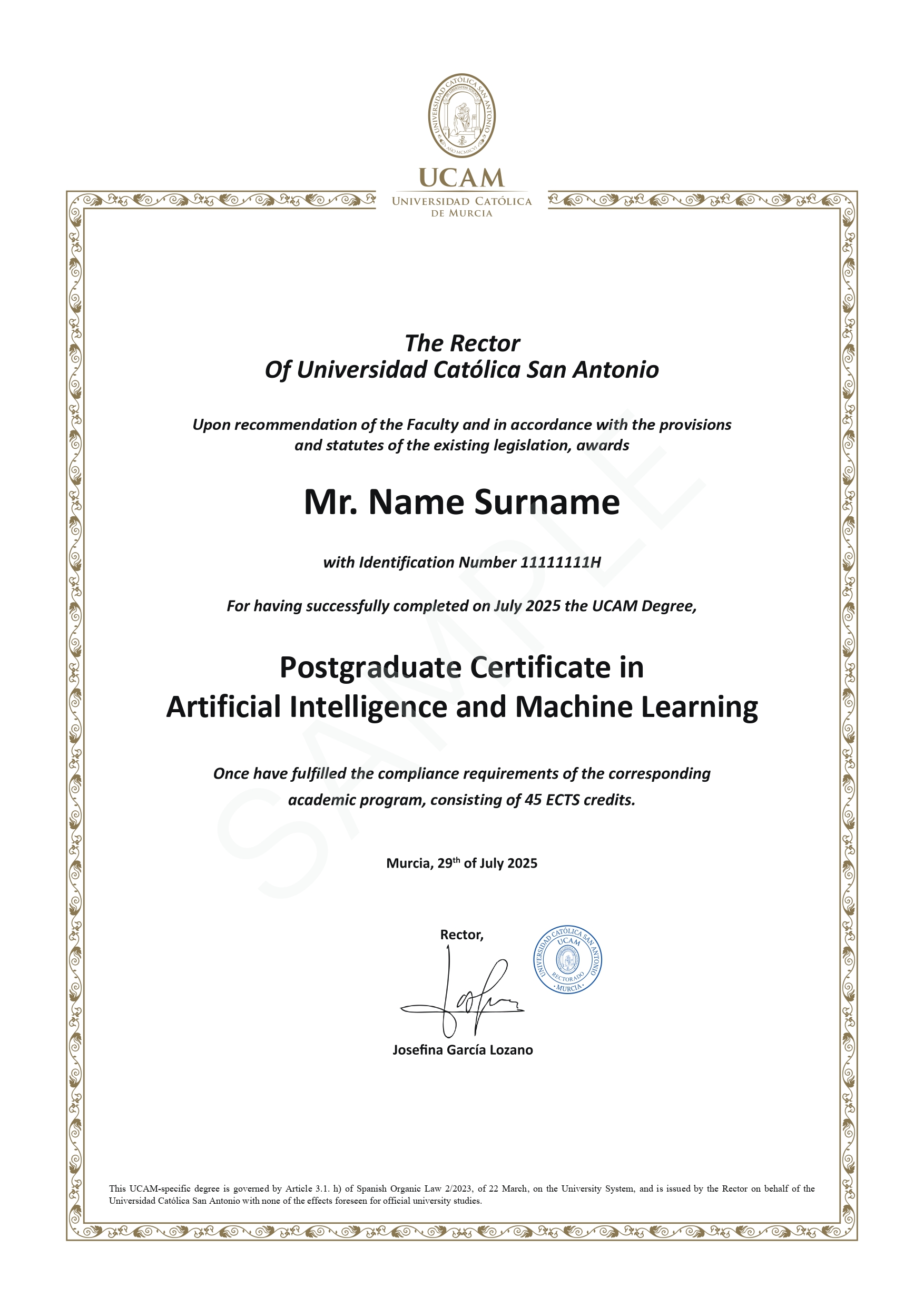
Postgraduate Certificate in Artificial Intelligence and Machine Learning

Elevate your career with our comprehensive 6-month Advanced Program in Data Science, certified by Acacia University. This professional development program equips you with in-demand skills in Python programming, data analytics, machine learning, and AI implementation through 80 hours of live instructor-led training.

- Duration
6 Months
- Modules
5 Modules
- Assignments
4 Assignments
- Format
Online Learning
- Projects
3 Projects
- Level
Intermediate
Globally Recognized & Accredited:





Students Trained Globally
Industry-Aligned Programs
Countries with Active Alumni
Career Transition Success
- Industry-Standard Technology Stack
Tools & Technologies That Power Success
Master the complete data science ecosystem with hands-on experience using industry-leading tools and frameworks. Our Advanced Program in Data Science equips you with practical skills in Python programming, data manipulation, visualization, and machine learning – preparing you for real-world data challenges.
- Production-Ready Skills
- Industry-Relevant Tools
- Hands-On Learning
Python

MySQL

Anaconda

Jupyter Hub
Pandas
NumPy
Seaborn
Matplotlib
Excel
GIT
HTML

CSS
- Industry-Standard Technology Stack
Tools & Technologies That Power Success
Master the complete data science ecosystem with hands-on experience using industry-leading tools and frameworks. Our Advanced Program in Data Science equips you with practical skills in Python programming, data manipulation, visualization, and machine learning – preparing you for real-world data challenges.
- Production-Ready Skills
- Industry-Relevant Tools
- Hands-On Learning
Python

MySQL

Anaconda

Jupyter Hub
Pandas
NumPy
Seaborn
Matplotlib
Excel
GIT
HTML

CSS
Acacia University Professional Development

Eligibility
Prerequisites
Course Modules
Python Basics and Core Concepts
Learn fundamental Python programming including variables, data types, conditional statements, loops, and functions. Master the building blocks essential for data science applications.
Essential Python Libraries
Practical Programming Skills


Learning Outcomes
By completing this foundational module, you will:
- Master Python programming structure and learn how to write efficient programs for data analysis
- Understand core Python concepts including syntax, functions, and conditional statements for problem-solving
- Acquire essential Python skills to transition into specialized branches like Machine Learning and Data Science
- Gain proficiency with key libraries (NumPy, Pandas, Matplotlib) to write scripts for data manipulation and analysis
Mathematical Foundations
Master linear algebra, probability theory, statistics, and statistical tools. Build the mathematical foundation required for advanced data analysis and machine learning algorithms.
Data Formats & Tools
Data Cleaning & Preparation


Learning Outcomes
By completing this module, you will:
- Master statistical tools for working with datasets effectively
- Learn the essentials of probability and statistics for data analysis & visualization
- Know how to import and clean data using libraries like NumPy and Pandas for data exploration and analysis
- Learn to fix incorrect, corrupted, incorrectly formatted, duplicate, or incomplete data within a dataset
Pandas Mastery & Data Frames
Explore the Pandas library fundamentals and learn to create data frames and series. Master the essential tool for data manipulation and analysis in Python.
Data Collection & Selection
Data Processing Techniques
Master data cleaning, standardization, and normalization processes. Learn to transform messy data into clean, analysis-ready datasets using industry best practices.


Learning Outcomes
By completing this module, you will:
- Explore the basic understanding of Pandas library – Develop your programming skills with fundamental tools
- Discover how to use pandas to streamline data cleaning and pre-processing
- Learn how to create data frames and series in pandas
- Analyze the process of collecting, cleaning, and pre-processing data
- Learn how to select data using Pandas
Machine Learning Fundamentals
Master supervised and unsupervised learning concepts using Scikit-learn. Learn data modeling techniques and discover predictive relationships in datasets through hands-on practice.
Version Control & Development
Learn Git Version Control System (VCS) for managing code and collaborating on projects. Master essential development workflows for data science and machine learning projects.
Model Deployment & WebView


Learning Outcomes
By completing this module, you will:
- Learn about training data and how to use datasets to discover potentially predictive relationships
- Understand basic concepts and common tools used in machine learning
- Master machine learning techniques, including supervised and unsupervised learning with hands-on modeling
- Learn the basics of HTML/CSS and Git version control system (VCS)
- Build and deploy a model to enable WebView functionality
Unsupervised Learning Mastery
ML Model Deployment
Hybrid Model Development
Learn to innovatively blend supervised and unsupervised models for enhanced performance. Master techniques for tracking and interpreting deployed models.


Learning Outcomes
By completing this specialization, you will:
- Understand the significance of carefully defining the problem before choosing a technique
- Learn how to get data ready for unsupervised algorithms in particular
- Explore options for integrating unsupervised models into the organization’s decision-making process
- Discover how to innovatively blend supervised and unsupervised models for improved performance
- Learn to interpret and track your unsupervised models for ongoing development
Your Success Story Starts Here
Every image here tells a story of transformation, dedication, and success. Be the next to wear the cap and gown. Enroll today, and let your journey begin.
Student Reviews
Every student has a story—of ambition, of challenge, of growth. In their own words, they share how Airtics became a turning point in their learning journey and helped them move closer to their goals.
Mohammed Ajmal

Airtics offers a truly transformative learning experience. The course content is up-to-date, the mentors are incredibly supportive, and the flexibility of the online platform made it easy to balance with my work. Highly recommended for anyone looking to upskill!
- Verified Review
Mohammed Ajmal

Airtics offers a truly transformative learning experience. The course content is up-to-date, the mentors are incredibly supportive, and the flexibility of the online platform made it easy to balance with my work. Highly recommended for anyone looking to upskill!
- Verified Review
Mohammed Ajmal

Airtics offers a truly transformative learning experience. The course content is up-to-date, the mentors are incredibly supportive, and the flexibility of the online platform made it easy to balance with my work. Highly recommended for anyone looking to upskill!
- Verified Review
Mohammed Ajmal

Airtics offers a truly transformative learning experience. The course content is up-to-date, the mentors are incredibly supportive, and the flexibility of the online platform made it easy to balance with my work. Highly recommended for anyone looking to upskill!
- Verified Review
Real-World Capstone Projects
Apply your data science skills to solve real business challenges through hands-on projects. Choose from our curated capstone projects or bring your own organizational problem to create a portfolio that showcases your expertise to future employers.
House Rental Predication
Image Classification
Business Insights Reporting
Learn from Industry Leaders & Experts
Learn from the best in the field. Our faculty combines academic brilliance with industry expertise, featuring PhD holders, senior data scientists, and AI researchers from top organizations.
Global Student Community
Students from 60+ Countries Worldwide









Frequently Asked Questions
Basic knowledge of programming logic and technology exposure will be helpful.
Automated transport, taking over dangerous jobs, robots working with humans, improved elderly care, cyborg (organic/bio-mechanic) organisms, environment monitoring and response to climate change goals.
Yes. The average base pay for a machine learning engineer in the US is $123,608, as of April 2022. According to a December 2020 study by Burning Glass, demand for AI and machine learning skills is projected to grow by 71 per cent over the next five years. The same study reports a $14,175 salary premium associated with these skills.
Still have questions?
If you have any other questions or need further information about our Advanced Program in Data Science, don’t hesitate to contact us. Our admissions team is here to help you take the next step in your data science career.


















